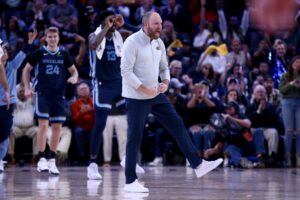The 2019 NBA Playoffs marked the 22nd straight postseason appearance for the San Antonio Spurs. The sustained dominance of the franchise is seemingly approaching the end. Three out of the last five postseason have ended in the first round.
Most recently, the Spurs lost a heartbreaking seven game series to the up and coming Denver Nuggets. In game seven, Coach Gregg Popovich played three true backcourt players – Derrick White, Bryn Forbes, and Patty Mills – none of which play as a true point guard. They ranked 11th in assists per game (21.1), 13th in passes made (253.1), and 15th in potential assists (35.4) out of 16 playoff teams.
On the other side of the court, the Spurs struggled to get defensive stops. They allowed the Nuggets to shoot 46 percent from the field (12th), forced 4.6 steals per game (16th), and four blocks (tied for 10th). Both, offensively and defensively the Spurs are looking for help to continue their playoff streak. The return of Dejounte Murray will help bring stability to that depleted backcourt.
Dejounte Murray Prior to the Injury
Entering the 2016 NBA Draft after one year at the University of Washington, Dejounte Murray faced a lot of criticism. He was cited as a talented, young player with inefficiencies shooting and taking care of the ball. Certainly, when you look at the numbers, the criticism matches; he averaged 29 percent from three and 3.2 turnovers per game. However, the flashes of his willingness to pass and his ability to defend were apparent.
Through two seasons as a professional, Murray hasn’t improved his jumper enough to impact the Spurs desperate need of additional shooters. Prior to the injury, he averaged just 0.4 three-point attempts per game on 27 percent shooting. The Spurs looked to be content with finishing in the bottom third of shooting. Mills, Forbes, and Marco Belinelli are the only backcourt players to average over two three-point attempts while averaging greater than 37 percent.
Dejounte Murray’s Impact
Playmaking
Murray’s impact will be made through his underrated playmaking ability and elite defense. In 79 games during the 2017-18 season, he led the team in passes made per game (41.9), secondary assists (0.7), and second in assists (2.9). The Spurs offense emphasizes making the extra pass, making it difficult to rank high across the league in assist.
In fact, the Spurs haven’t had a player finish in the top 10 for total assists in a season since Tony Parker finished seventh during the 2011-12 season. During that season, Parker had a near career high in usage (27.7 percent) and played 32.1 minutes per game. In comparison, Murray played 21.5 minutes per game with a low point guard usage rate of 20.7 percent.
Murray’s playmaking ability stems from his dexterity in attacking the rim; 60 percent of his shots come from inside 10 feet. His efficiency around the rim and willingness to attack was missed greatly last season. The team dropped from 19th in points in the paint per game in 2017-18 to 28th last season. The combination of Murray and White will help bolster their offensive diversity.
Defense
Jimmy Butler, Joel Embiid, Draymond Green, and Al Horford all share a similar trophy as Dejounte Murray – the 2017-18 NBA All-Defensive Second Team trophy. Not only is it impressive to be mentioned with possibly four future Hall-of-Famers, but to pass a guaranteed future Hall-of-Famer in Kobe Bryant as the youngest player ever to make an All-Defensive team is very impressive.
Statistically, Murray’s numbers don’t jump off the screen as historic. He averaged 1.4 steals per game (ranked 41st), 0.4 blocks per game (112th), 4.3 defensive rebounds (72nd). Even his advanced stats appeared pedestrian.
Defensive win shares (DWS) look at an estimate of points a player allows per 100 possessions and calculates that to equal an estimate of how many wins a player adds or subtracts. Murray added 3.4 wins on the defensive end, which ranked him 26th.
Defensive box plus-minus (DBPM) evaluates the box score and analyzes the impact a player has through counting stats (e.g. steals, blocks, etc.). DBPM isn’t the most reliable stat but helps confirm a player to be an effective or defective defender. Murray confirmed he was one of the top 10 defenders in the league by ranking 6th at 3.4.
The eye test displayed his ability to disrupt a team’s offensive flow. He forced teams to run their offense through their forwards and dictated the pace teams would play. Out of the 29 other teams the Spurs played during the 2017-18 season, 27 of them saw a drop off in their average pace of play. Only the New Orleans Pelicans and Utah Jazz saw a slight increase (0.02 and 0.03 respectively in added possessions). Whereas, the Philadelphia 76ers averaged 7.5 fewer possessions against the Spurs.
Murray’s pressure on the ball was apparent in every game he played in. The ball pressure forced opposing teams to initiate their offense a few seconds later than they normally would. This directly caused a lower amount of possessions for each team.
Backcourt Partner
Heading into the 2019-20 NBA season, the Spurs will likely have five guards – Dejounte Murray, Bryn Forbes, Derrick White, Patty Mills, and Lonnie Walker IV. Murray has played with three out of the four (hasn’t played with Walker). When paired with one of the three in the backcourt, the two-man combinations resulted in the Spurs outscoring the opponent.
The Murray and Forbes combination outscored opponents by 120 points throughout the season in 619 minutes. The Murray and Mills combination outscored opponents by 72 points in 773 minutes. Lastly, the Murray and White combination outscored opponents by 25 points in 57 minutes.
The return of Dejounte Murray will add depth to an effective backcourt. Last season, Mills and White outscored opponents by 75 points in only 299 minutes together. Extended minutes for Murray and White together could turn into one of the best young backcourts in the league. And, certainly is one of the best defensive backcourts in the league, regardless of age.
The Return of Dejounte Murray
Overall, the recently turned 23-year old will be a welcomed sight to the Spurs organization. They are in desperate need of a lead guard with his talent level. For 17 seasons, the Spurs relied on Tony Parker’s ability to navigate the paint and create offense individually. It appears the Spurs have the second coming of that. The opportunity to maintain their dominance is now left in the capable hands of Dejounte Murray.
*All statistics were pulled from NBA.com/stats or Basketball-Reference.com
Main Photo
Embed from Getty Images






